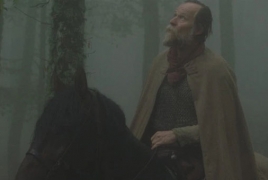“Little Crusader” Kadrnk’s rigorous 2nd feature: Karlovy Vary review July 10, 2017 - 12:00 AMT PanARMENIAN.Net - An epic poem makes for echoingly sparse cinema — however vast the historical milieu — in “Little Crusader”, a tight-lipped study in Medieval minimalism from talented Czech formalist Václav Kadrnka. Saddling up alongside an ageing warrior on a grueling, far-reaching search for his missing son, Kadrnka’s first feature since his Berlinale-premiered 2011 debut “Eighty Letters” takes inspiration from 19th-century lyrical poet Jaroslav Vrchlický — but swiftly sheds any period adventure trappings in favor of a more metaphysical journey, sewn through with religious imagery and devotional slow-cinema technique. As a kind of monument to be gazed upon, with its wealth of stark, sun-bleached tableaux in Academy ratio, it’s rather arresting; as living, breathing cinema, it’s somewhat hard work, inspiring more formal curiosity than feeling, despite its elemental emotional stakes, a Variety review said. That austerity will make “Little Crusader” a tough sell to distributors, though it should find favor with more esoterically inclined festival programmers, maintaining its helmer’s reputation as one of Czech cinema’s most singular rising talents. Narratively and stylistically, one could even pitch Kadrnka’s film to arthouse-savvy audiences as “Jauja” in hessian robes: There are shades of Lisandro Alonso’s serene shaggy-dog story in its gradual, dreamy fusion of environment and psyche, its languid approach to an urgent onscreen search mission, and, yes, its boxy-is-beautiful aspect ratio — though it has to be said that a dry, puckish sense of humor is not among “Little Crusader’s” assets, the review said. Even in its native Czech Republic — sharing co-production honors here with Italy and Slovakia — Vrchlický’s poem “The Little Crusader of Svojanov” is not a broadly-known standard. The poem concerns itself with the Children’s Crusade, a heavily questioned, myth-muddled chapter of history in which armies of European Christian youths were said to be at the forefront of a drive to expel or convert Muslims in the Holy Land. Kadrnka’s interpretation (co-written with Vojtěch Mašek and Jiří Soukup) avoids this apocryphal minefield by stripping the historical context down to a simple, idealized destination: When, at the film’s outset, golden-haired pre-teen Jenik (Matouš John) leaves home in search of the Holy Land, it has the air of a fairytale quest. A junior-size sword in his belt isn’t enough to prevent the doughty youngster from losing his way in the tanned, dry landscape, after Jan Baset Střítežský’s camera calmly watches him disappear past the horizon in one of the film’s many elegantly studied, patiently held long shots. The film’s perspective thereafter aligns with that of Jenik’s father Bořek (Czech veteran and sometime Hollywood bit player Karel Roden), a venerable knight who swiftly gives chase, but can never seem to catch up with his son. Time and geography turn elastic as Bořek loses his bearings and his focus, sinking into despair until he in turn becomes the rescue project of a strapping younger fighter (Aleš Bilík). “Little Crusader” might be read as an allegory for the parental life cycle: the way time and age diminish a guardian’s authority and protective capacity until they’re the ones in need of care. Even at this level, however, the film remains a defiantly remote, cryptic achievement, its emotions as constrained as its rigorous visual framing. Střítežský’s robust lensing, soft in palette but unyielding in composition, effectively uses the limitations of its aspect ratio to suggest Bořek’s intensifying tunnel vision, as he is persistently taunted in his search by what lies just out of view. Irena Havlová and Vojtěch Havel’s keening string score, meanwhile, provides this film of few words with a running lament, the review said. Related links: The creative crew of the Public TV had chosen 13-year-old Malena as a participant of this year's contest. She called on others to also suspend their accounts over the companies’ failure to tackle hate speech. Penderecki was known for his film scores, including for William Friedkin’s “The Exorcist”, Stanley Kubrick’s “The Shining”. The festival made the news public on March 19, saying that “several options are considered in order to preserve its running” Partner news |